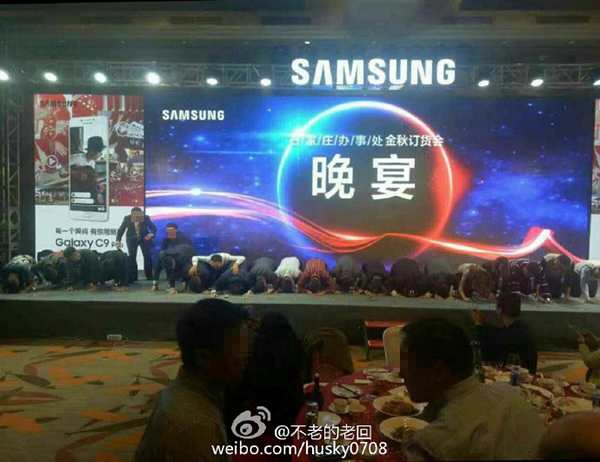


[File photo]
Chinese executives of Samsung Electronics got down on their knees to request more orders from dealers during a meeting in Shijiazhuang. This extreme action has stirred online debate over the now-controversial brand, further damaging its already tarnished reputation in China.
On Oct. 29, an Internet user named “Bulaodelaohui” posted a picture of several people kneeling on a stage with Samsung’s logo. The photo's accompanying information claimed that the group was Samsung’s Chinese executives, who were forced to kneel down and beg for orders. The user criticized Samsung, accusing the company of disrespecting Chinese culture and its Chinese employees.
The post soon went viral on Chinese social media. The hashtag “SamsungMakesChineseKneelForSales” has garnered over 1.9 million page views on Sina Weibo as of press time, with most comments condemning the company’s behavior as “an inhuman insult.”
“Despite the scandal of the Note 7 battery explosion, many dealers have shown their support for Samsung by ordering [our products], which has moved Samsung’s Korean executives. They knelt down to show their gratitude. Their Chinese counterparts were touched by the scene and also knelt down,” a press officer from Samsung China told Thepaper.cn on Oct. 30, adding that the incident happened during a regional ordering meeting in Shijiazhuang.
Kneeling in Korean culture is a gesture of gratitude and respect. The Korean executives don’t know the cultural connotation of kneeling in China, the officer added.
“Kneeling in Chinese culture is an expression of submission and reverence, and we only kneel before our ancestors. Samsung’s apology really disgusted me; this is China, and they should use the Chinese way of apologizing,” one Internet user commented.
The Samsung Chinese executives could not be reached for comment as of press time. It is not clear if Samsung demanded that the executives kneel, or if the executives simply chose to do so.
The recent recall of the fire-prone Galaxy Note 7 cut Samsung's mobile business earnings 96 percent year-on-year in the third quarter of 2016, down to 100 billion won ($87.6 million), the lowest level in nearly eight years, according to the company's latest quarterly report.
 Fire brigade in Shanghai holds group wedding
Fire brigade in Shanghai holds group wedding Tourists enjoy ice sculptures in Datan Town, north China
Tourists enjoy ice sculptures in Datan Town, north China Sunset scenery of Dayan Pagoda in Xi'an
Sunset scenery of Dayan Pagoda in Xi'an Tourists have fun at scenic spot in Nanlong Town, NW China
Tourists have fun at scenic spot in Nanlong Town, NW China Harbin attracts tourists by making best use of ice in winter
Harbin attracts tourists by making best use of ice in winter In pics: FIS Alpine Ski Women's World Cup Slalom
In pics: FIS Alpine Ski Women's World Cup Slalom Black-necked cranes rest at reservoir in Lhunzhub County, Lhasa
Black-necked cranes rest at reservoir in Lhunzhub County, Lhasa China's FAST telescope will be available to foreign scientists in April
China's FAST telescope will be available to foreign scientists in April "She power" plays indispensable role in poverty alleviation
"She power" plays indispensable role in poverty alleviation Top 10 world news events of People's Daily in 2020
Top 10 world news events of People's Daily in 2020 Top 10 China news events of People's Daily in 2020
Top 10 China news events of People's Daily in 2020 Top 10 media buzzwords of 2020
Top 10 media buzzwords of 2020 Year-ender:10 major tourism stories of 2020
Year-ender:10 major tourism stories of 2020 No interference in Venezuelan issues
No interference in Venezuelan issues
 Biz prepares for trade spat
Biz prepares for trade spat
 Broadcasting Continent
Broadcasting Continent Australia wins Chinese CEOs as US loses
Australia wins Chinese CEOs as US loses